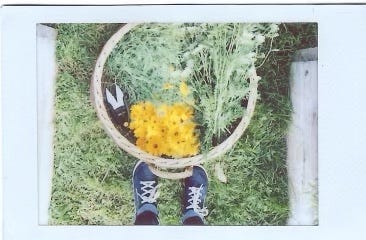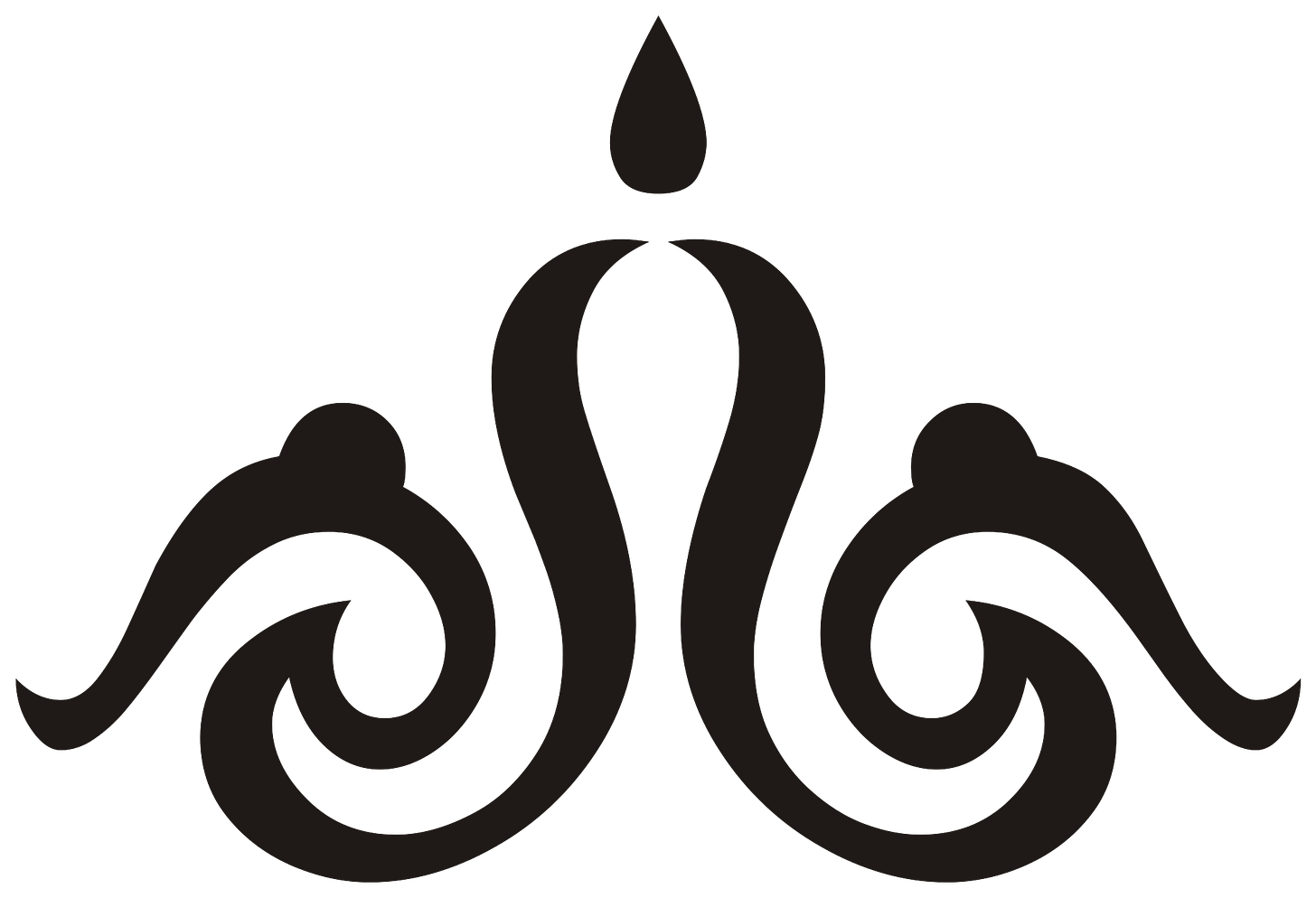On our way up to the hospital in Schenectady, my mother and I are talking about god. It’s 5am. The sky is dark, the streets snaking with the lights of long haul trucks.
I don’t think you understand the depth of my devotion to Baba, my mother says. She’s referring to the guru Sathya Sai Baba. The man with the saffron-orange robes and the big curly hair whose face was framed around my childhood home. I can smell my mother’s coffee, sitting in the console between us in a white travel mug, and my heart lurches a little with longing. I’ll be like a sadhu, a yogi, I think when I realize I won’t eat or drink for many more hours due to the surgery. No, I don’t think I do understand it, I say to her.
I’m about to have a cyst removed from my ovary. It’s been a little over two years since they found it on a follow-up scan after the miscarriage, and it isn’t going away. A dermoid cyst, a benign tumor made up of the stuff of a horror film: nails, teeth, fat, hair. A hormonal malfunction that resembles a baby that wasn’t meant to be. The risk with this kind of cyst is that it will keep growing and eventually get so heavy that it twists, cutting off blood flow to the ovary, killing it.
I haven’t prayed to Baba in a long time, but devotion was woven into my life as a child. My parents used to take my sister and me to Sai Baba retreats in Troy—not far from the hospital we’re going to now—where there was a large diaspora of Indians, many of them devotees. I remember how before we would enter the giant prayer room, we had to remove our shoes at the door. There was such intimacy in seeing that ocean of sandals and slip-ons, colorful and vacant as washed up shells. Inside, everyone sat on the floor, men on one side of the room, women on the other. We sang bhajans—devotional songs—and I felt myself enveloped in the wave of hundreds of voices singing together. I sang and sang, and I believed.
One of my college essays was about how, when I was very young, I used to imagine I was holding Sai Baba’s hand while ascending the rickety stairs to our attic—an act that always gave me the courage to face what I couldn’t see in the dark. But when I got to college, I just got embarrassed about it all. I became skeptical. When Baba died my junior year, I consoled my mother quietly over the phone and mentioned it to no one.
It’s amazing, isn’t it, my mother continues now as we drive on through the dark, this devotion, this belief. I never feel lonely. I’m never alone. This, at least, I can understand. It’s the way I feel when I’m in nature. When I’m out by myself on a trail, deep in the woods or in a meadow, I don’t feel alone at all. I am suffused with a sense of awe and belonging so great, I know I am loved. I know I am love.
One mild day in October 2020, I was crouched down among a stand of motherwort, down the road from where my mother was on an operating table. I took the square stalks with my shears. The surgeon took a part of her that was hers. Bees buzzed around the plastic bucket in which I placed the harvest of herbs. Occasionally, I paused under the dome of blue sky and pulled burrs from my wool sweater.
A member of the mint family, motherwort is said to be good heart medicine, an antidote for high blood pressure and palpitations, as well as heartache and grief. On the day of my mother’s mastectomy, I needed it badly. My heart was raw and galloping.
I worked slowly at the harvest, tasting the bitter leaves before placing them in the bucket, filling my mouth with its spice. I imagined the breast that gave me life, now a guppy of flesh tossed and flopping. Will they incinerate it, I wondered, like my ancestors’ bodies on a pyre? Will they bring the precious part of my mother’s motherhood to the gaping red mouth of the crematorium?
It had only been a couple months since I’d started working for the herbalist, but I was already completely devoted to plant medicine. Three days a week, I drove the backroads to a plot of farmland twenty minutes from home. The basement workshop was dark and smelled of vinegar, honey, and dirt. From the herbalist, I learned the healing properties of the plants that grew around us and how to extract them. How to lop off the flowering tops or take a knife to the thick white flesh of the roots. How to store brown-bottled tinctures in the dark, use a hydraulic press, apply heat to the stuck lid of a mason jar. I came to understand how to use certain plants at certain times of the year to activate the body’s systems, to strengthen the heart and nourish the blood. Mullein for lungs. Burdock for liver. Valerian to make you sleep.
As the world reeled from a virus for which we had no vaccine, and my mother underwent treatment for the relapsed tumor in her breast, I wanted to find my own tonic, my own cure. A cure I could prepare with the right ratio of herb to water to alcohol. A cure I could taste in the tender parts of living things.
I harvested and bottled, and I believed.
I didn’t find my god at the hospital. Not in the antiseptic wipe the nurse gave me to hold under my nose when I felt nauseous from the anesthesia. Not in the artificial cherry numbing spray for my throat after the breathing tube came out. My body swam with medicines: injections to keep me hydrated, to keep blood clots from forming. Pain killers, relaxants. Zofran sent through the IV tube when I thought I’d hurl.
I don’t make plant medicine anymore. I left my part-time job with the herbalist after a year, went back to making music and touring once the pandemic began to lift. I abandoned one ambition for another, and then back again. There’s a cupboard in the kitchen that’s full of herbs that have long gone moldy and dry, old infused vinegars that have corroded the metal lids of their jars. It’s not to say I’ll never do it again, just that my energies have wandered elsewhere.
I have a lot of shame about this. Popping another couple painkillers, I think, I should be taking white willow, which contains a pain-relieving compound called salicin, similar to aspirin. I should be tending the four incisions on my belly with a salve of comfrey and plantain, to help the skin heal faster. Because I do truly believe in the healing power of plants. I believe, I believe. I just don’t pray that way anymore.
What do you do when there’s a disconnect between devotion and action? Between belief and manifestation?
On the way home from the hospital, groggy with sedative, I watched while my god fell hard as rain. The sudden downpour whited out the windshield. And even though we could barely see, it felt like another kind of medicine. We were totally suffused.
There’s a game that my son River and I have started playing. When he makes the ASL sign for “more”—his tiny hands pinched together—and gets a twinkle in his eye, I look at him in disbelief. What? I say in my best British accent, mimicking my mother’s boarding school tongue. You want more FLOWERS?! Then I stomp off in feigned frustration to get the little lord more flowers. He loses it every time. His laughter is electric.
I bring him Queen Anne’s lace and goldenrod and chicory. I pile clover flowers and knapweed before him. More, more, more. The plants keep coming. The earth keeps giving. I lay the blossoms at my child’s feet. This too is medicine. This is devotion.







NANDI..Devotion..so many..so honest..I love how you gave them the importance. And signifigance..'.of traveling elsewhere thru your energies'.....they do..
Devotion..to the earth..the flowers the medicine that you learned of and hold true...and scatter at Rivers sweet feet...mother's deep devotion...beautiful!!
Such a poetic, raw piece of writing. I too have marveled at your mom's devotion to Sai Baba, often envying the deep commitment and conviction she has. I too lean into nature to find answers to my 'why's' - which usually comes in the form of nature's constancy, her insistence upon going forward, offering up steady abundance, replenishing and minding her own business. It does not feel to me like the same kind of devotion that Amber has...I waiver to understand my role in the cycle of it, other than the noticing and the reflecting and the honoring.
Please keep writing Nandi.